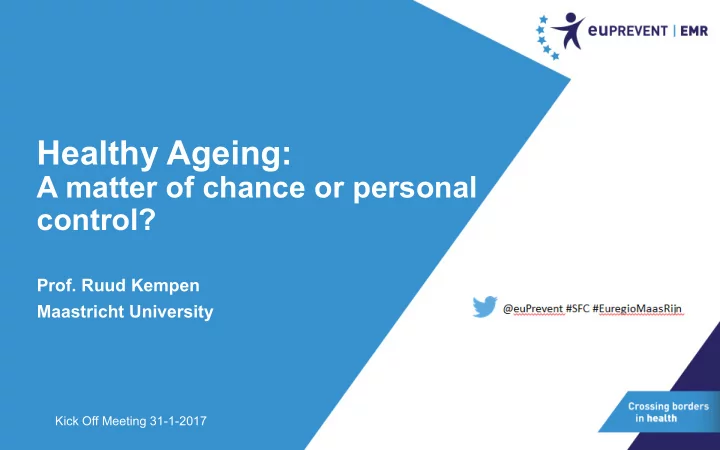

Healthy Ageing: A matter of chance or personal control? Prof. Ruud Kempen Maastricht University Kick Off Meeting 31-1-2017
Percentage 65+ in 2013 and 2050 40 35 30 25 2013 20 2050 15 10 5 0 Bron: Vienna Institute of Demography, 2014
Demographics (Netherlands) 1998 2012 2050 Population (in millions) 15,7 16,7 18,1* Proportion 65+ (%) 13,5 16,8 26,2* Life expectancy (years) male 75,1 79,4 85,6* female 80,6 82,8 88,9* Sources : CBS Statline, 2009/2014; *CBS Statline 2016
Life Expectancy (1) • Female versus male +4 • Married/cohabitting versus living alone • Male +4 • Female +2 • Grandparents • Two of 80+ +2 • Four of 80+ +4 • Socio-economic status • Difference high-low +6 Source: Knook & Ulrich, 2003; Volksgezondheidenzorg.info, 2015
Life Expectancy (2) • Smoking • Non-smoking men +2 • Smoking men - 6 • Non-smoking women +1 • Smoking women - 5 • Obese • Male - 6 • Female - 7 • Positive life attitude +7
(Healthy) Life Expectancy Male Female 1970-2012 2012 1970-2012 2012 Life Expectancy 79,4 + 8,3 82,8 + 6,3 Each year + 10 weeks + 8 weeks Life Expectancy with good experienced health 64,7 62,6 Difference (poor health) 14,7 20,2 Source: Volksgezondheidenzorg.info, 2015
Question? How can we explain that some older persons – despite the development of chronic conditions and diseases – function in daily life on a acceptable level while this does not hold for other ones …………… ?
A Life Course Approach to Active Ageing Early Life Adult Life Older Age ity Growth and Maintaining highest Maintaining independence and al capacit development possible level of preventing disability function tional nction Func Fu Dis isabi bilit lity y thre hresh shold ld Rehabilitation and ensuring the quality of life Age Source: Kalache and Kickbusch, 1997
Disablement Process Extra-individual factors (a.o. medical treatment, rehabilitation, care, devices, physical environment) Pathology → Impairments → Functional → Disability limitations Risk factors Intra-individual factors (a.o. life style, psychosocial attributes as coping, personal control ) Verbrugge & Jette, Soc Sci Med 1994; 38: 1-14; Kempen, Tijdschr Gerontol Geriatr 2009: 40: 253-261
Personal control • Definition: beliefs that important aspects of one’s life are under one’s control – and that outcomes (including health, disability) depend on one’s own choices and actions Measurement • I have little control over the things that happen to me • There is really no way I can solve some of the problems I have • There is little I can do to change many of the important things in my life Ranchor et al Soc Sci Med 2010; 70: 1825-1831
Three questions with respect to personal control • Is it stable (‘ personality trait ’)? • Does it affect health or functioning? • Can it be changed?
Is personal control stable? Personal control in 1993 and 2001 in community- Personal control before and after the diagnosis of living older adults (N = 1541) cancer in older adults; a prospective study ( N = 99)
Does personal control affect health and functioning? Functional disability after fall-related injuries according to two levels of personal control; a prospective study ( N = 171) fall
Does personal control affect health and functioning? Bosma et al, Psychology & Health 2005; 19: 103-115
Can personal control be influenced? Effect of cognitive behavioral group intervention to reduce fear of falling and activity avoidance on perceived control ( N = 540)
Effect of cognitive behavioral group intervention to reduce fear of falling and activity avoidance on symptoms of depression (HADS) ( N = 540) 7 6,8 6,6 6,4 6,2 Intervention 6 Control 5,8 5,6 5,4 5,2 Baseline 2 mo 8 mo 14 mo Zijlstra R. PhD thesis Maastricht University 2008
Take home messages Personal control … • … not as stable over time as sometimes suggested • … has an impact on physical and mental functioning in old age • … can be influenced by intervention So healthy ageing may be at least partly a matter of personal control
Recommend
More recommend